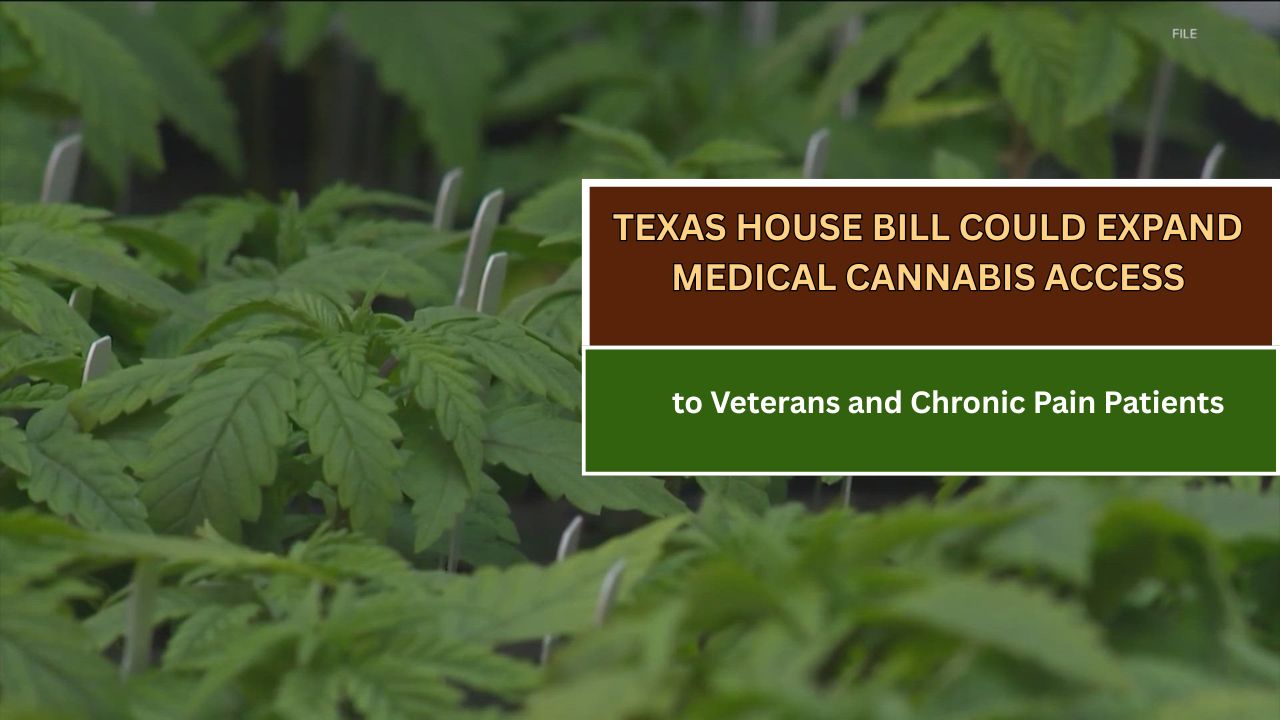AUSTIN, Texas — After serving 25 years in the U.S. Army, including a tour in Iraq, David Bass returned home with symptoms he didn’t recognize: sleeplessness, hypervigilance, and recurring nightmares.
“I was hypervigilant, had trouble sleeping, had nightmares about some things that happened in Iraq,” Bass said.
Eventually diagnosed with post-traumatic stress disorder (PTSD), Bass found relief not in traditional medications, but in medical cannabis.
“Cannabis controlled the symptoms of paranoia, anger outbursts. I sleep perfectly for eight hours every night. The nightmares about Iraq went away,” he said.
Bass is now one of many Texans advocating for House Bill 46 (HB 46), which is set for a vote in the Texas House on Monday. If passed, the bill would mark one of the most significant expansions of the state’s Compassionate Use Program since it was created in 2015.
What House Bill 46 Would Change
HB 46, authored to expand medical access to cannabis, includes several major reforms aimed at increasing patient eligibility and product availability. The proposed legislation would:
- Expand qualifying conditions to include:
- Chronic pain
- Traumatic brain injury
- Crohn’s disease
- Degenerative disc disease
- Allow additional product types, including:
- Cannabis patches, lotions, and topicals
- Prescribed inhalers and vaping devices
- Permit the Department of Public Safety (DPS) to:
- Issue more dispensing licenses
- Authorize more satellite dispensing locations
These changes would dramatically increase access for Texans across rural and underserved regions.
“We have patients in the Panhandle and in West Texas who have a hard time getting their medicine,” said Dr. Matthew Brimberry, a palliative care physician in Austin.
Medical Cannabis and Patient Impact
Dr. Brimberry, who specializes in treating patients with complex conditions, said that medical cannabis often replaces multiple sedating pharmaceuticals for his patients.
“They’re able to have a better life without all that sedating medication,” he said. “It’s a series of small miracles.”
For veterans like David Bass, the benefits have been deeply personal—and transformational.
“Cannabis is medicine, so let’s treat it as medicine. And for me and many other veterans, cannabis has been life-changing,” Bass said.
Currently, access to legal medical cannabis in Texas is limited to a small number of conditions, such as epilepsy, terminal cancer, multiple sclerosis, and PTSD. HB 46 could significantly expand this list and normalize cannabis-based treatments as part of mainstream medical care.
Geographic Barriers and Access Challenges
Access remains a major obstacle for patients across the state. Texas currently operates with a limited number of licensed dispensaries, and the large distances between cities pose challenges for patients in rural areas.
“Opening satellite locations will reduce travel burdens and improve adherence to care,” advocates say.
The ability to authorize more dispensaries and satellite outlets could be especially important for low-income patients, the elderly, and disabled veterans who struggle to travel long distances for consistent medical treatment.
Next Steps: House Vote and Implementation
HB 46 is scheduled for a vote in the Texas House of Representatives on Monday. If passed, the bill would go into effect on September 1, 2025.
The measure has bipartisan support and is widely backed by veterans’ groups, physicians, and patient advocacy organizations.
“This is not about getting high. It’s about getting well,” said one advocate for the bill.
However, opponents of cannabis expansion in Texas have historically raised concerns about regulatory oversight and the risk of recreational use under a medical label. Still, support for compassionate use policies continues to gain ground both publicly and legislatively.
Cannabis Reform in Texas: A Broader Trend?
Texas has made incremental steps in cannabis reform over the last several years. The Compassionate Use Program, established in 2015, has been expanded slowly—first allowing low-THC cannabis for epilepsy, and later for terminal cancer and PTSD.
But even with recent changes, Texas remains one of the most restrictive states when it comes to medical marijuana access.
A successful vote on HB 46 could signal the state’s most significant policy shift yet, aligning Texas more closely with other conservative-leaning states like Florida and Oklahoma that have expanded access in recent years.
What Happens Next?
If approved by the House, HB 46 will move to the Texas Senate for consideration. If it clears both chambers and receives the governor’s signature, it will take effect in early September.
For patients like David Bass and the many Texans still waiting for relief, that day can’t come soon enough.
This article has been carefully fact-checked by our editorial team to ensure accuracy and eliminate any misleading information. We are committed to maintaining the highest standards of integrity in our content.

Outside of work, he enjoys playing chess, following cricket, and writing short stories. His commitment to integrity and in-depth analysis strengthens OTE News’ mission of providing trustworthy journalism.



